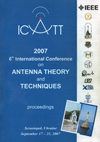Sensitivity characteristics of different configurations of software gradiometers used in magnetocardiography
DOI:
https://doi.org/10.1109/ICATT.2007.4425198Keywords:
inverse problems, magnetocardiography, magnetostatics, sensors, software gradiometersAbstract
It is common to use high-order (2nd-3rd) gradiometers in magnetocardiographic measurements to filter out environmental noise. Such gradiometers consist of several coils connected serially with different polarity. Contemporary technology allows using software gradiometers, which measure signal from each coil separately and sums them with required weights at post processing. So there is a possibility to combine the signals from elementary sensors in different configuration by setting different weights. Such different schemes can be used for purposes of background noise filtering and solving the inverse problem. The subject of this study is to compare several summing configuration in terms of sensitivity to the source parameters.References
WIKSWO, J.P. SQUID Magnetometers for Biomagnetism and Nondestructive Testing: Important Questions and Initial Answers. IEEE Trans. Applied Superconductivity, Jun. 1995, v.5, n.2, p.74-120, doi: http://dx.doi.org/10.1109/77.402511.
PRESS, W.H.; TEUKOLSKY, S.A.; VETTERLING, W.T.; FLANNERY, B.P. Numerical Recipes in C: The Art of Scientific Computing, 2nd ed. Cambridge University Press, 1992.
BUTRYM, A.Y.; DURNEVA, Y.V.; SHULGA, S.N. Comparison of two methods of source localizations in magnetocardiography problems. Radio Physics and Radio Astronomy, 2006, v.11, n.4, p.397.
BAGATSKAYA, O.; BUTRYM, A.; DURNEVA, Y.; SHULGA, S.; TUZ, V. Two-dipole inverse problem of magnetostatics for reconstruction of heart electric activity from magnetocardiography measurements. Proc. of Int. Conf. on Mathematical Methods in Electromagnetic Theory, Kharkiv, Ukraine. IEEE, 2006, p.132-134, doi: http://dx.doi.org/10.1109/MMET.2006.1689723.

